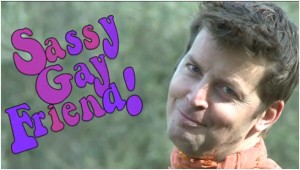Something’s Rotten in the State of Heterosexual Love?
In March 2010, The Second City, the renowned Chicago- and Toronto-based comedy improv company, released on its YouTube network “Sassy Gay Friend: Hamlet.” The short video, which has received over 1 million hits to date, mocks Shakespeare’s most well-known play, specifically the character Ophelia who grows mad and ultimately drowns herself because her lover, Hamlet, has forsaken her. The video claims that Shakespeare’s tragedy would have ended much differently “if Ophelia had a Sassy Gay Friend.” Take a look:
The following week, The Second City released “Sassy Gay Friend: Romeo and Juliet,” which ridicules Juliet’s naïve decisions and hastiness (e.g., “You love [Romeo]? You met him Sunday; it’s barely Thursday. Slow down, Crazy, slow down”). Then two weeks later, the wittiest of the bunch appeared, “Sassy Gay Friend: Othello,” which pokes fun at Desdemona’s gullibility and pretentiousness (e.g., “Some guy ends up with your handkerchief so your husband gets to murder you?”). I imagine there will be more additions to the series in the coming weeks perhaps featuring Lady Macbeth, Cordelia, and/or Lavinia. And then who knows? Maybe the troupe will tackle the Bard’s comedies; after all, Helena and Hermia from A Midsummer Night’s Dream could certainly use a sassy gay friend. In any case, the videos are a hit. But why?
First, I think the videos are popular because they spoof plays that most people studied in high school and/or college; as a result, the stories are familiar. Second, they are spot-on if not simplistic interpretations of Shakespeare’s tragic characters: the seemingly rather passive, patient female and the rather insane, dangerously impulsive male. Third, the videos are short and sharable. I doubt the videos would circulate this much had they greatly exceeded their one-minute running-times; too much Shakespeare usually does not a viral video make. Fourth, although the series relies heavily on stereotyping, it is amusing and apparently inoffensive. For example, several gay fans openly express their love it:
- “I feel cool now cuz I am a sassy gay friend” (degeorgetitanic)
- “As a sassy gay friend […] I absolutely love this video!” (Periclease)
- “See, without us gay guys, life would be boring.” (MascotSith666)
- “I love this! It’s so true! I’ve always gotten the dish on my friends’ sex lives. (edgarae1)
In fact, it was a gay friend who introduced me to the Hamlet parody, offering, “If you need me to guest lecture for one of your [Shakespeare] classes, I’ll fly right in. Super-gay scarf at no additional charge.”
But what strikes me about the videos is their timely message: heterosexual relationships are threatening, insufferable, and unbalanced. Notably, the homosexual figure in the short narrative represents common sense, frankness, and discernment; in short, he is a sassy savior. I wonder, then, if a fifth reason the videos are so popular is that they reflect the current volatile state of heterosexual romantic relationships, particularly those represented in the public eye and in popular culture. See, for example, the deteriorating and/or fractured relationships of Tiger and Elin Woods, Jesse James and Sandra Bullock, David Letterman and Regina Lasko, Jon and Kate Gossalin, David and Michelle Patterson, Eliot and Silda Spitzer, Larry and Suzanne Craig, John and Elizabeth Edwards, and Mark and Jenny Sanford.
Also affirming this notion is the recent onslaught of “bromance” movies and television shows in which heterosexual romance is either floundering or virtually nonexistent and homosociality is the norm, e.g., Superbad (2007), I Love You, Man (2009), Hot Tub Time Machine (2010), House (2004-present), Boston Legal (2004-08). Finally, even fans of the Sassy Gay Friend series seemingly recognize their own dysfunctional (heterosexual?) relationships and the need for a rational non-heterosexual companion. For example, one viewer “needs a sassy gay friend to give it to me straight” while another claims that her/his gay friend is the only person who “really does keep me sane” while still another wishes, “God, I want him as my sassy gay friend. He would stop so many bad choices.” Such statements not only suggest that these fans are perhaps incapable of making wise decisions on their own, but also that their presumably heterosexual relationships are unstable and/or unhealthy. The sassy video series may originate with 400-year-old texts, but it is almost unquestionably of this time period.




This is excellent Kelli — your reasoning regarding Sassy Gay Friend as a manifestation of a culture marked by deep uncertainties about heterosexual couplehood is persuasive. In addition to the rash of high-profile celbrity breakups and the bromance, I’dd only that the chick flick demonstrates on a nearly weekly basis a propensity for staging transparently unconvincing couple closures (e.g. The Bounty Hunter).
Thanks, Diane! I couldn’t help but also think of Tina Fey’s “Brownie Husband” sketch on SNL this past weekend: http://www.youtube.com/watch?v=BwGf0RgHr7w
PS. I really enjoyed your post on Sandra Bullock and the “mancession.”
[…] In March 2010, The Second City, the renowned Chicago- and Toronto-based comedy improv company, released on its YouTube network “Sassy Gay Friend: Hamlet.” The short video, which has received over 1 million hits to date, mocks Shakespeare’s most well-known play, specifically the character Ophelia who grows mad and ultimately drowns herself because her lover, Hamlet, has forsaken her. The video claims that Shakespeare’s tragedy would have ended much differently “if Ophelia had a Sassy Gay Friend.” Read more at Antenna […]
[…] Shakespeare’s tragedy would have ended much differently “if Ophelia had a Sassy Gay Friend.” Read more at Antenna Share / Print / […]